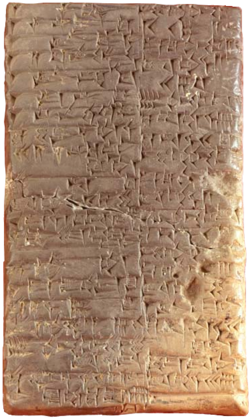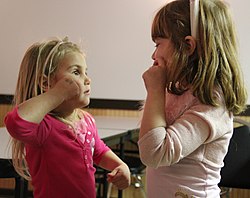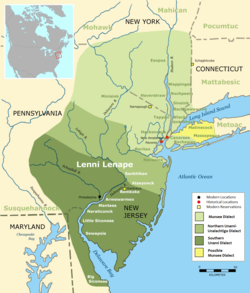Portal:Language
Introduction




Language is a structured system of communication that consists of grammar and vocabulary. It is the primary means by which humans convey meaning, both in spoken and signed forms, and may also be conveyed through writing. Human language is characterized by its cultural and historical diversity, with significant variations observed between cultures and across time. Human languages possess the properties of productivity and displacement, which enable the creation of an infinite number of sentences, and the ability to refer to objects, events, and ideas that are not immediately present in the discourse. The use of human language relies on social convention and is acquired through learning.
Estimates of the number of human languages in the world vary between 5,000 and 7,000. Precise estimates depend on an arbitrary distinction (dichotomy) established between languages and dialects. Natural languages are spoken, signed, or both; however, any language can be encoded into secondary media using auditory, visual, or tactile stimuli – for example, writing, whistling, signing, or braille. In other words, human language is modality-independent, but written or signed language is the way to inscribe or encode the natural human speech or gestures.
Depending on philosophical perspectives regarding the definition of language and meaning, when used as a general concept, "language" may refer to the cognitive ability to learn and use systems of complex communication, or to describe the set of rules that makes up these systems, or the set of utterances that can be produced from those rules. All languages rely on the process of semiosis to relate signs to particular meanings. Oral, manual and tactile languages contain a phonological system that governs how symbols are used to form sequences known as words or morphemes, and a syntactic system that governs how words and morphemes are combined to form phrases and utterances.
The scientific study of language is called linguistics. Critical examinations of languages, such as philosophy of language, the relationships between language and thought, how words represent experience, etc., have been debated at least since Gorgias and Plato in ancient Greek civilization. Thinkers such as Jean-Jacques Rousseau (1712–1778) have argued that language originated from emotions, while others like Immanuel Kant (1724–1804) have argued that languages originated from rational and logical thought. Twentieth century philosophers such as Ludwig Wittgenstein (1889–1951) argued that philosophy is really the study of language itself. Major figures in contemporary linguistics include Ferdinand de Saussure and Noam Chomsky. (Full article...)
Selected language -

Munsee (also known as Munsee Delaware, Delaware, Ontario Delaware, Delaware: Huluníixsuwaakan, Monsii èlixsuwakàn) is an endangered language of the Eastern Algonquian subgroup of the Algonquian language family, itself a branch of the Algic language family. Munsee is one of two Delaware languages (also known as Lenape languages, after the tribe's autonym). It is very closely related to the Unami Delaware, but the two are sufficiently different that they are considered separate languages. Munsee was spoken aboriginally by Lenape in the vicinity of the modern New York City area in the United States, including western Long Island, Manhattan Island, Staten Island, as well as adjacent areas on the mainland: southeastern New York State, the northern third of New Jersey, and northeastern Pennsylvania.
As of 2018, Munsee was spoken only on the Moraviantown Reserve in Ontario, Canada, by two elderly individuals, aged 77 and 90, making it critically endangered. As of 2022, only one elderly native speaker remained. When the number of speakers was somewhat larger, the language was reported to differ between individual speakers, each having a personal dialect. There has been interest in learning the language by younger individuals. Some researchers and universities have partnered with indigenous communities in an effort to revitalize the language, notably Montclair State University and the University of Toronto. (Full article...)
Did you know (auto-generated)

- ... that Le langaige du Bresil, one of the earliest documentary sources of any South American language, demonstrates that Europeans and Brazilian indigenous peoples maintained intimate social contacts?
- ... that the Akademia Nasionala del Ladino in Israel is dedicated to preserving the Judaeo-Spanish language?
- ... that The Seoul Press was an English-language newspaper created to justify Japan's colonial rule of Korea?
- ... that a Hawaii TV station's switch from Japanese-language programming to home shopping stirred viewer outcry?
- ... that the slogan "One Nation, One Language" has been used to justify the imposition of Hindi?
- ... that in 1903, Georg Forchhammer invented a system to help his deaf students see the sounds of spoken Danish?
More did you know -
- ...that there are seven dialectal groups of the Polish language, each primarily associated with a certain geographical region?
- ...that the Noric language is attested in only two inscriptions, one from Grafenstein, Austria, and the other from Ptuj, Slovenia?
- ...that Soviet literature declared Russian the "world language of internationalism", denouncing French as the "language of fancy courtiers" and English as the "jargon of traders"?
- ...that the Himariote Greek dialect retains several archaic features no longer found in standard modern Greek?
Categories
Linguistics: Computational linguistics • Grammar • Historical linguistics • Morphology • Phonetics • Phonology • Pragmatics • Reading • Semantics • Sociolinguistics • Syntax • Writing
Languages: Language families • Pidgins and creoles • Sign languages
Linguists: By nationality • Historical linguists • Morphologists • Phoneticians • Phonologists • Sociolinguists • Syntacticians • Translators
Stubs: Constructed languages • Languages • Linguists • Pidgins and creoles • Typography • Vocabulary and usage • Writing systems
Full Language category tree
|
|---|
|
Select [►] to view subcategories
|
Related portals
Selected topic -

The Organisation internationale de la Francophonie (OIF; sometimes shortened to La Francophonie, French: La Francophonie [la fʁɑ̃kɔfɔni], sometimes also called International Organisation of La Francophonie in English) is an international organization representing where there is a notable affiliation with French language and culture.
The organization comprises 93 member states and governments; of these, 56 states and governments are full members, 5 are associate members and 32 are observers. The term francophonie (with a lowercase "f"), or francosphere (often capitalized in English), also refers to the global community of French-speaking peoples, comprising a network of private and public organisations promoting equal ties among countries where French, Belgian, Swiss, Canadian people or France, Belgium, Switzerland or Quebec play a significant historical role, culturally, militarily, or politically. (Full article...)
Selected picture -

The Rosetta Stone is an ancient Egyptian granodiorite stele inscribed with a decree issued at Memphis in 196 BC on behalf of King Ptolemy V. The decree appears in three scripts: the upper text is Ancient Egyptian hieroglyphs, the middle portion Demotic script, and the lowest Ancient Greek.
Language News
- 13 June 2025 – Middle Eastern crisis
- Exiled crown prince Reza Pahlavi, the son of Iran's last Shah, writes in Farsi calling for the Iranian military to abandon the Islamic Republic and accuses Supreme Leader Ayatollah Ali Khamenei of forcing Iranians into the war. He also refers to the war as "Khamenei's war and the Islamic Republic's war". (Jerusalem Post)
- 1 March 2025 – Executive orders in the second presidency of Donald Trump
- United States President Donald Trump signs an executive order designating English as the country's official language. (The Guardian)
- 27 February 2025 –
- OpenAI releases their latest large language model, GPT-4.5. (The Verge)
Topics

Languages of Africa: Arabic, Chadic, Cushitic, Kanuri, Maasai, Setswana, Swahili, Turkana, Xhosa, Yoruba, Zulu, more...
Languages of the Americas: Aleut, Carib, Cherokee, Inuktitut, Iroquois, Kootenai, Mayan, Nahuatl, Navajo, Quechuan, Salish, American Sign Language, more...
Languages of Asia: Arabic, Assamese, Balochi, Bengali, Chinese, Japanese, Hajong, Hebrew, Hindustani, Kannada, Kokborok, Marathi, Khasi, Korean, Kurdish, Malayalam, Manipuri, Meithei, Mongolian, Persian, Rajasthani, Sindhi, Sanskrit, Sylheti, Tamil, Tanchangya, Tulu, Telugu, Tibetan, Thai, Turkish, Vietnamese, Khowar, more...
Languages of Austronesia: Austric, Fijian, Hawaiian, Javanese, Malagasy, Malay, Maori, Marshallese, Samoan, Tahitian, Tagalog, Tongan, Auslan, more...
Languages of Europe: Basque, Czech, Danish, Dutch, English (book), French, German, Greek, Italian, Latin, Leonese, Norwegian, Polish, Portuguese, Romanian, Russian, Slovak, Spanish, Ukrainian more...
Constructed languages: Esperanto, Ido, Volapük, more...
Agglutinative language, Analytic language, Constructed language, Creole, Context-free language, Extinct language, Dialect, Fusional language, Inflectional language, International language, Isolating language, Language isolate, National language, Natural language, Pidgin, Pluricentric language, Polysynthetic language, Proto-language, Sign language, Spoken language, Synthetic language, Variety (linguistics)

Applied linguistics, Cognitive linguistics, Accent (dialect), Computational linguistics, Descriptive linguistics, Eurolinguistics, Generative linguistics, Historical linguistics, Lexicology, Lexical semantics, Morphology, Onomasiology, Phonetics, Phonology, Pragmatics, Prescription, Prototype semantics, Psycholinguistics, Semantics, Stylistics, Sociolinguistics, Syntax
See also: List of linguists

Alphabets: Arabic alphabet, Bengali alphabet, Cyrillic alphabet, Hebrew alphabet, Latin alphabet, more...
Other writing systems: Abjad, Abugida, Braille, Hieroglyphics, Logogram, Syllabary, SignWriting, more..
See also: History of the alphabet, Script
Associated Wikimedia
The following Wikimedia Foundation sister projects provide more on this subject:
-
Commons
Free media repository -
Wikibooks
Free textbooks and manuals -
Wikidata
Free knowledge base -
Wikinews
Free-content news -
Wikiquote
Collection of quotations -
Wikisource
Free-content library -
Wikiversity
Free learning tools -
Wiktionary
Dictionary and thesaurus
Find a language
| Enter an ISO 639 code to find the corresponding language article |





















